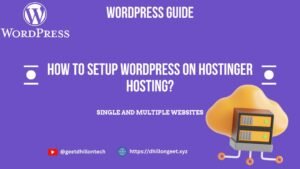When you’re planning to launch a website, one of the first and most important decisions is choosing the right type of hosting. Hosting affects your website’s speed, uptime, scalability, and overall performance.
In this blog, we’ll dive deep into the various types of hosting, how they work, who they’re best for, their pros and cons, and what to look out for when choosing one.
Blog – Factors to consider for Selecting Right Hosting for Your Website
Topics Covered
Need Personal Help Deciding Which Hosting is Best for You?
I know—there’s a lot of information here! If you’re still not sure about which host to choose (or which plan to purchase), you’ve got two choices:
👉 1. Just want the best discounts for speedy, trustworthy budget hosting?
If getting a budget hosting which is reputable, reliable, trustworthy and will keep your website fast, secure and optimized you can connect with me. I can get you exclusive deals on hosting providers for free. Just click the link below, fill out a small form, I will personally help you avail the discounts for free.
🔗 Click here to avail discounts!
👉 2. Want discounts + 1-on-1 setup help?
If you want me to help you pick the perfect plan, guide you on the right hosting setup, so that you don’t overpay and underpay for the type of website you want to build and even install WordPress for you,
🔗 Go for 1-on-1 Session + Setup Help
1️⃣ Shared Hosting
What is it? Your website is stored on a server that also hosts many other websites. All the sites share the server’s resources (CPU, RAM, bandwidth).
Best For: Beginners, small blogs, portfolios, low-traffic sites.
Pros:
- Most affordable hosting type
- Easy to set up and manage
- Great for beginners
Cons:
- Shared resources can slow down your website
- Not suitable for high-traffic or resource-heavy websites
- Limited control and customization
Recommended Providers:
2️⃣ Cloud Hosting
What is it? Your website is hosted on a network of interconnected servers (the “cloud”). If one server fails, another takes over — providing better uptime and flexibility.
Best For: Growing websites, business sites, LMS, moderate-to-high traffic.
Pros:
- Scalable and flexible
- High uptime and reliability
- Better performance than shared hosting
Cons:
- Slightly higher cost than shared hosting
- May have a learning curve for beginners
Recommended Providers:
3️⃣ VPS Hosting (Virtual Private Server)
What is it? You share a physical server with others, but your portion is isolated with dedicated resources. It mimics a dedicated server experience in a shared environment.
Best For: Medium-sized businesses, websites needing more control and power.
Pros:
- Dedicated resources (CPU, RAM, etc.)
- More control than shared or cloud hosting
- Better performance and security
Cons:
- Requires some technical knowledge
- More expensive than shared hosting
Recommended Providers:
4️⃣ Dedicated Hosting
What is it? You rent an entire physical server solely for your website. All resources are exclusively yours.
Best For: Enterprise-level businesses, high-traffic websites, resource-heavy applications.
Pros:
- Full control over server
- Maximum performance and security
- Can handle large volumes of traffic
Cons:
- Very expensive
- Requires server management expertise
Recommended Providers:
5️⃣ Managed WordPress Hosting
What is it? A type of hosting optimized specifically for WordPress sites. It includes updates, backups, security, and performance enhancements — all managed for you.
Best For: WordPress users who want a hassle-free experience.
Pros:
- Optimized speed and performance for WordPress
- Automatic backups and updates
- Managed security and support
Cons:
- More expensive than regular shared hosting
- Often limited to WordPress only
Recommended Providers:
6️⃣ Reseller Hosting
What is it? You buy hosting from a provider and resell it to clients under your brand. Great for web designers or agencies.
Best For: Freelancers, agencies, hosting resellers
Pros:
- Create and manage multiple client websites
- Branding flexibility
- Can generate recurring income
Cons:
- Requires customer management and support
- Profit depends on pricing and client volume
Recommended Providers:
7️⃣ Free Hosting (Not Recommended)
What is it? Hosting provided at zero cost, often with major limitations.
Best For: Testing or learning only
Pros:
- Completely free
Cons:
- Limited features and control
- No custom domain (usually a subdomain)
- Ads may be displayed on your site
- Poor performance and security
Examples:
- 000webhost
- InfinityFree
Blog – Step By Step Guide for choosing the Right Hosting For Your Website
| Hosting Type | Best For | Budget Level | Technical Skill Needed |
|---|---|---|---|
| Shared | Beginners, blogs, portfolios | 💰 Low | 👶 Easy |
| Cloud | Business, LMS, growing websites | 💰💰 Medium | 👨💻 Moderate |
| VPS | Medium businesses, tech-savvy users | 💰💰💰 Higher | 👨💻👨🔧 Moderate–High |
| Dedicated | Large enterprises | 💰💰💰💰 High | 👨🔧 High |
| Managed WordPress | WordPress users | 💰💰 Medium | 👶 Easy |
| Reseller | Freelancers/agencies | 💰💰 Medium | 👨💻 Moderate |
| Free Hosting | Learning or testing only | 💰 Free | 👶 Easy |

Get the latest blogs and insights straight to your inbox !
We will keep you updated with the latest tips, tricks, hacks and learning material. Join us and enrich your world with great learning.



